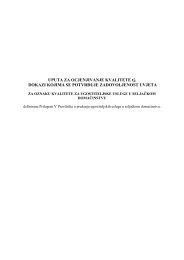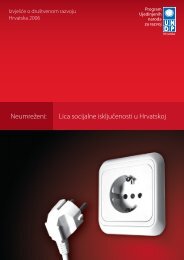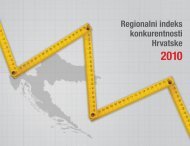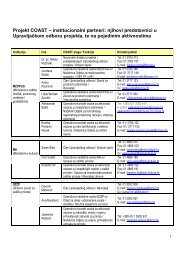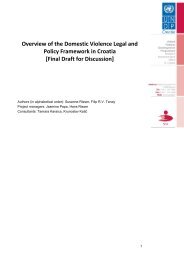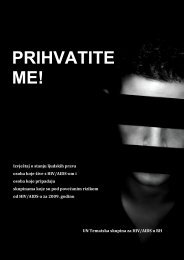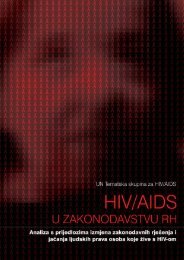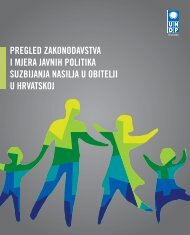WEB engleska verzija end.indd - UNDP Croatia
WEB engleska verzija end.indd - UNDP Croatia
WEB engleska verzija end.indd - UNDP Croatia
- No tags were found...
Create successful ePaper yourself
Turn your PDF publications into a flip-book with our unique Google optimized e-Paper software.
THE SOCIALLY EXCLUDEDCHAPTER 3parents, was identified by one in two single mothers,and one in four single fathers. Financial problemsmay increase the depressiveness of parents, anddepressed parents are less involved in their children’s’lives, have less insight into their children’s activities,and are able to provide less overall support to theirchildren (Raboteg-Šarić and Pećnik,2006).The research also pointed to the problem of realizingthe right of child care support. Only one in threedivorced parents (35.2%) and one in six unmarriedmothers (16.9%) regularly receive child support fromthe absentee parent. Forty-three percent of divorcedparents do not receive child support at all, and inthe case of unmarried mothers this percentage isas high as 66.3% (Raboteg-Šarić et al., 2003). Evenmore discouraging is data gathered from a nationallyrepresentative sample of single parents which revealsthat only 8% of single parents received child supportin 2005 (<strong>UNDP</strong>, 2006a). Typical reasons for this are animproperly functioning court system, unemploymentof the other absentee parent or his or her employmentin the ‘grey’ economy.The establishment of a state child support fundwithin the National Family Policy (Puljiz and Bouillet,2003) presents one possible solution to this predicament.More than three-quarters of single parentssupport this measure (Raboteg-Šarić et al., 2003;200). However, “after several announcements madeby the Government of the Republic of <strong>Croatia</strong>, as wellas several discussions on legislative proposals in theParliament, the idea of establishing the child supportfund was abandoned, with an explanation that it isnecessary to wait for the establishment of familycourts, whose role in the payment of advances onmaintenance from the state budget is not completelyclear” (Rešetar, 2005; 171).In regard to the realisation of employment rights,single parents are subject to the same generaldiscrimination against women and parents on thelabour market as the general population. While thenumber of official complaints concerning discriminationagainst single parents is relatively low, 96 researchsuggests that there are a number of instances that gounreported 97 with parents keeping quiet about theirsingle-parent status (Raboteg-Šarić i sur., 2003; <strong>UNDP</strong>,2006b).Not all single parents are exposed to the same degreeto the threat of social exclusion. Judging by the resultsof research conducted by <strong>UNDP</strong> (2006a), one in foursingle parents feels excluded from society, which is ahigher rate than that of dual parents. Additional analysesshow that single parents who feel excluded fromsociety (N=29) compared to other single parents (N=85)are characterised by a lower level of employment andeducation, a lower income level, and less frequentcontacts with the family, fri<strong>end</strong>s or neighbours. 983.6.2 Access to Social Services<strong>Croatia</strong>n laws enable single parent families to exercisegeneral rights provided for by the system of socialwelfare (counselling, one-time financial assistance,assistance in food and clothes), child bonuses, maternityleave and subsidised services for children. At thelocal level, there are also other benefits for workingsingle parents who have pre-school and school agedchildren (reduced kindergarten fees, co-financedwarm meals in school, free school books). The mainservices provided by the state are the child bonuses,which were received by half (<strong>UNDP</strong>, 2006a) or threequarters(Raboteg-Šarić et al., 2003) of the singleparents included in the two researches. Any custodialparent whose average monthly income generated inthe previous year per household member does notexceed 40% of the budget base is entitled to thisbenefit. The amount of the child bonus does notcover the costs of supporting the child or ensure anadequate standard of living.96 The report of the G<strong>end</strong>er Equality Ombudsman for 2005 mentions family and parental status as the basis for discrimination in 0.7% ofcomplaints against discrimination in employment and labour received in 2005.97 Interviews with 97 single parents showed that so far for one in two single parents, single parenthood has not posed a difficulty in findinga job, performing their job or being successful in their career (Raboteg-Šarić et al., 2003; 317).98 Although obtained on a very small sample, so one should consider them carefully, these results are in line with the expectations arisingfrom social exclusion based on three key dimensions of deprivation – unemployment, poverty and social isolation (Matković i Stulhofer,2006).73



